Which creatine is best for you? Creatine Monohydrate vs HCL – 5 Best Creatine Supplements in 2022
To better understand which creatine is best for you, you need first to understand more about this amino acid.
Table of Contents
- Here’s the list of the best creatine supplements in the market
- BEST CREATINE SUPPLEMENT OVERALL
- BEST CREATINE SUPPLEMENT MADE WITH CREAPURE
- BEST CREATINE SUPPLEMENT FOR ATHLETES
- BEST HYPOALLERGENIC CREATINE SUPPLEMENT
- BEST QUICK-DISSOLVING CREATINE SUPPLEMENT
- What is Creatine?
- Which type of creatine is best?
- Does creatine actually work?
- Which is the best type of creatine? Monohydrate vs HCL
- Is creatine bad for your kidneys?
Here’s the list of the best creatine supplements in the market
- Best creatine supplement overall: Optimum Nutrition Micronized Creatine Monohydrate Powder, Keto Friendly on Amazon
- Best creatine supplement made with Creapure: Muscle Feast Creapure Creatine Monohydrate Powder, Vegan Keto Gluten-Free on Amazon
- Best creatine supplement for athletes: Thorne Creatine – Amino Acid Creatine Powder on Amazon
- Best hypoallergenic creatine supplement: Pure Encapsulations Creatine Powder | Creatine Monohydrate on Amazon
- Best quick-dissolving creatine supplement: Naturebell Creatine Monohydrate Powder on Amazon
We include products we think are useful for our readers. If you buy through links on this page, we may earn a small commission.
BEST CREATINE SUPPLEMENT OVERALL
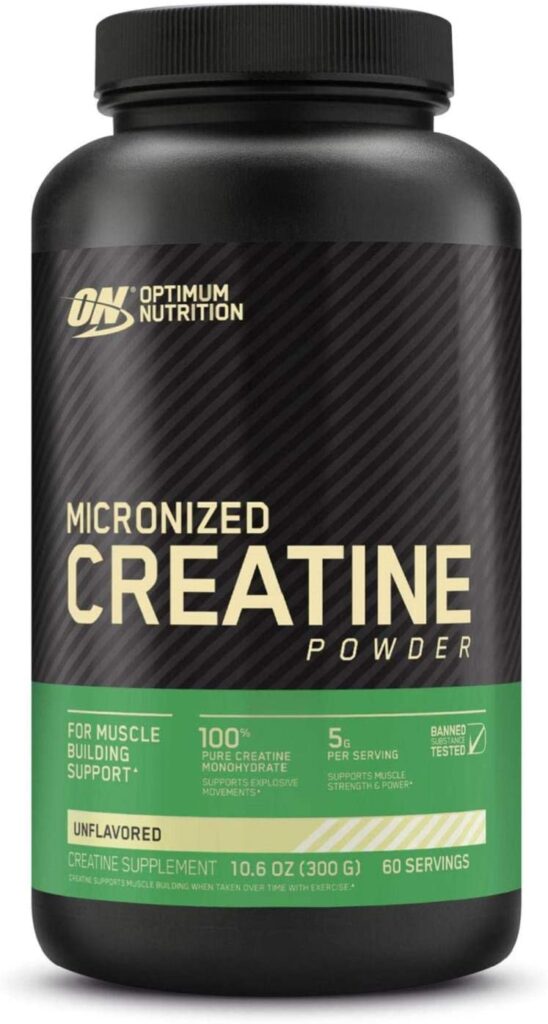
Optimum Nutrition Micronized Creatine Monohydrate Powder, Keto Friendly
5G PURE CREATINE MONOHYDRATE PER SERVING
SUPPORTS INCREASES IN ENERGY, ENDURANCE AND RECOVERY
MAXIMUM POTENCY – supports muscle size, strength, and power
SUPREME ABSORBENCY – micronized to get the most out of each dose
UNFLAVORED – can be mixed in your favorite beverage with ease. Contains allergens like milk,soy,gluten,egg,nuts and peanuts
AVAILABLE IN 150, 300, 600, 1200, 2000 GRAM BOTTLES
Product does not come with scoop
BEST CREATINE SUPPLEMENT MADE WITH CREAPURE
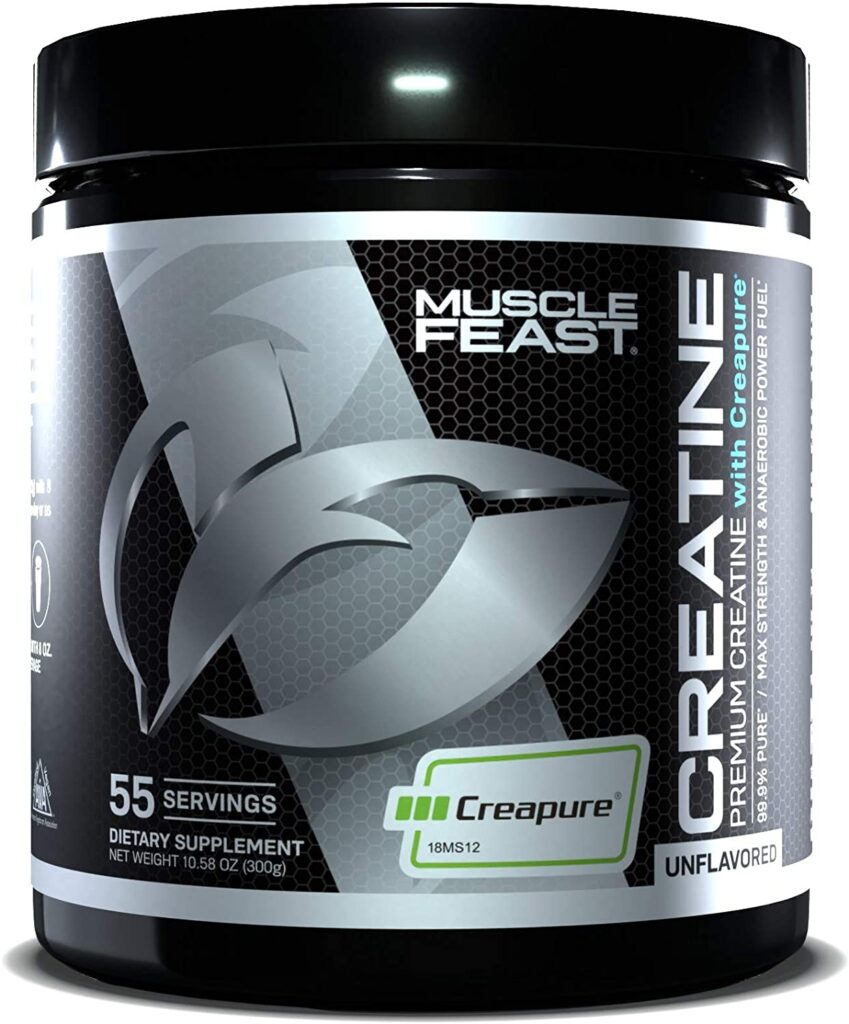
Muscle Feast Creapure Creatine Monohydrate Powder, Vegan Keto Gluten-Free
99.9% PURE: Ranked highly on Labdoor, vegan creatine monohydrate contains only pure creatine and no other ingredients; gluten-free and certified OU-D Kosher for dairy. 55 Servings (5400Mg of Premium 100% Pure German Creatine Per Serving)
POWERFUL MUSCLE BUILDING: Creapure creatine monohydrate helps you build muscle and recover faster for more effective workouts and less soreness
BUILDS ENDURANCE: German creatine monohydrate helps increase maximum output for sports that require repeated bursts of power
VEGAN AND KETO-FRIENDLY: Vegetarians are shown to have lower muscle creatine stores compared to those that eat meat, making supplementing with non-GMO creatine for muscle building crucial to their overall health
LABELS MAY VARY: This vegan creatine powder was recently certified by the American Vegetarian Association to be Vegan; We are updating our labels to reflect this information. You may receive a label without the badge; however, the ingredients have been approved by the American Vegetarian Association
BEST CREATINE SUPPLEMENT FOR ATHLETES

Thorne Creatine – Amino Acid Creatine Powder
Muscle Mass: Creatine is an amino acid that promotes lean body mass and supports increases in muscle endurance, muscle capacity, and power output*
Cellular Energy Production: Creatine helps the cells of the body more efficiently create energy, thus benefiting exercise capacity*
Brain Function: Although creatine is known for its muscle-enhancing benefits, it has also been shown to support cognitive function*
NSF Certified For Sport: Supports high-performance nutrition programs and is NSF Certified for Sport
Trusted: Thorne is chosen by champions and trusted by 100+ pro teams. Thorne is the only supplement manufacturer to collaborate with Mayo Clinic on wellness research and content. Thorne is also a proud partner of 11 U.S. Olympic Teams
BEST HYPOALLERGENIC CREATINE SUPPLEMENT
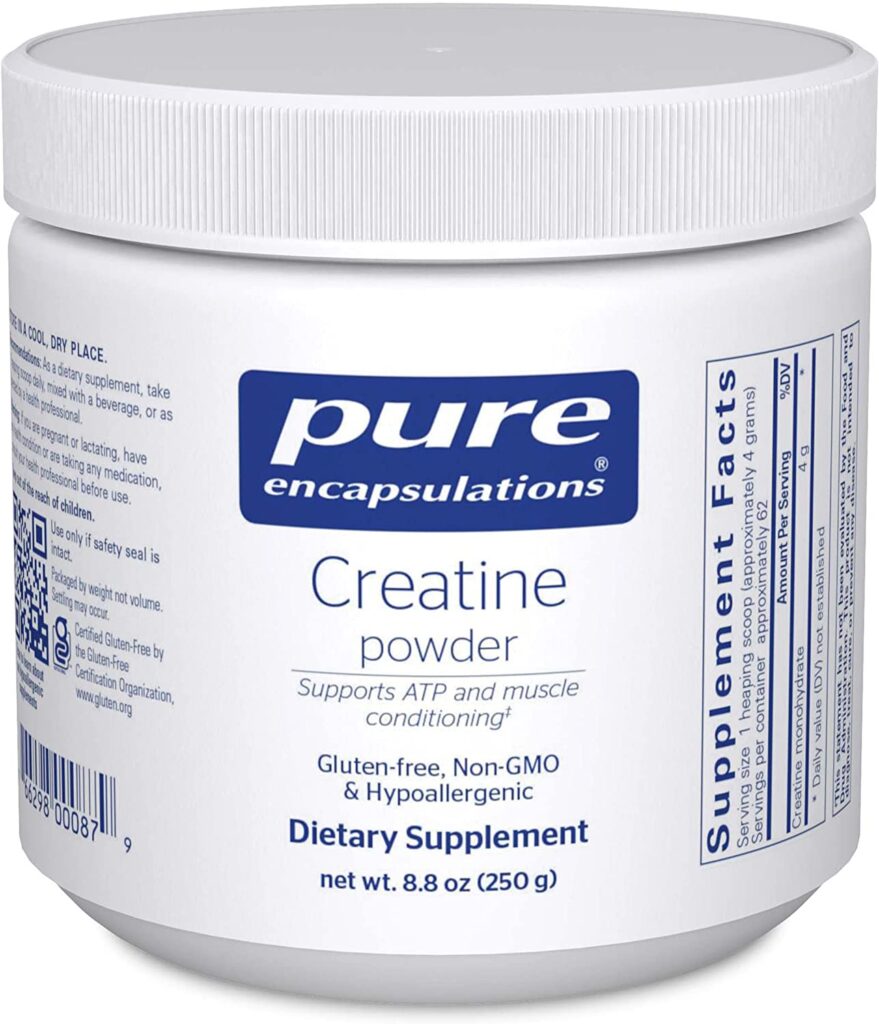
Pure Encapsulations Creatine Powder | Creatine Monohydrate
Athletic Performance Support: Creatine monohydrate powder offers support for athletes seeking peak performance during short-duration, high-intensity workouts.*
Muscle Recovery Support: Creatine monohydrate supports the body’s natural ability to regenerate energy in working muscles to potentially increase work output.*
Increased Cellular Energy: Creatine monohydrate has the potential to increase optimal work output in activities such as weight-lifting and sprinting.*
Pure Quality: Our supplements are made with only premium ingredients sourced from trusted suppliers and guided by our nutritional experts, then carefully manufactured and tested to verify their potency and purity.
Pure Difference: What makes us different isn’t just our process or what goes into our supplements — what we leave out matters, too. Pure Encapsulations products are FREE FROM wheat, eggs, tree nuts & peanuts, gluten, artificial colors, flavors & sweeteners, coatings and shellacs, GMOs, and unnecessary binders, fillers & preservatives.
BEST QUICK-DISSOLVING CREATINE SUPPLEMENT
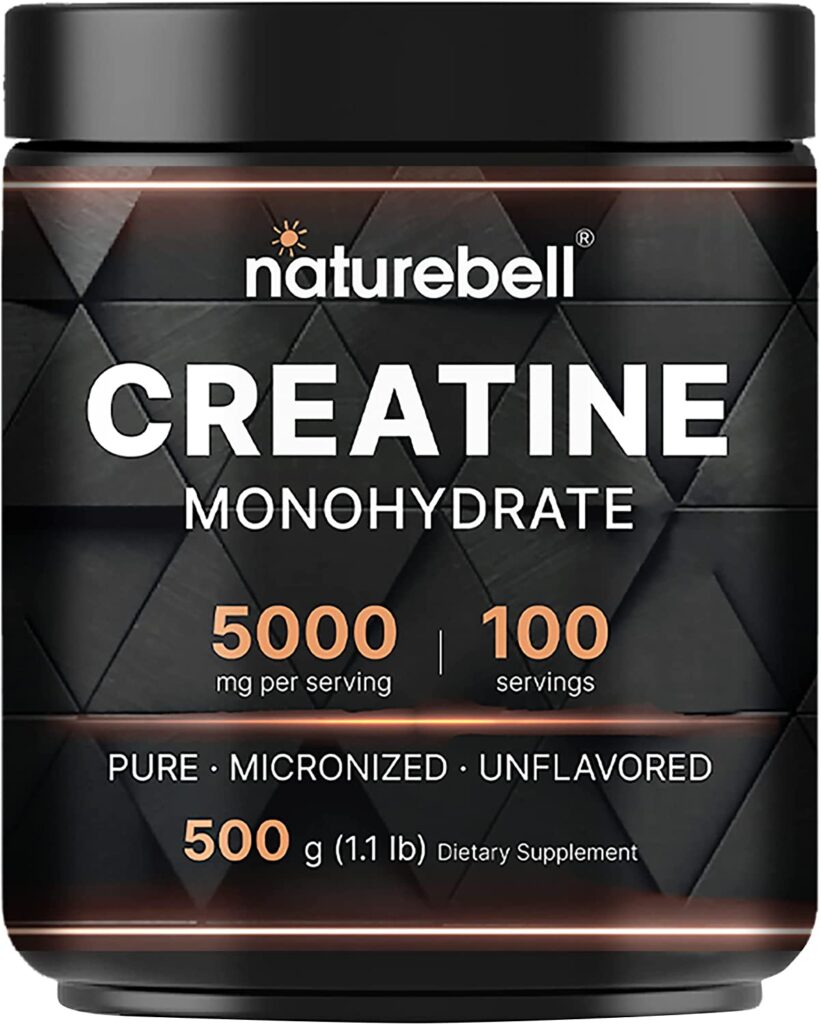
Naturebell Creatine Monohydrate Powder
NatureBell pure, unflavored creatine monohydrate quick-dissolving powder.
Easily absorbed Non-GMO creatine powder. Made with keto & vegan friendly ingredients that are free of gluten, wheat, soy, dairy, eggs, fish/shellfish, tree nuts, and peanuts. It is also 3rd party lab tested for purity and potency.
Pure Unflavored Creatine Powder
Micronized – Pre Workout
Keto
Vegan
Dissolves Easy
Filler Free
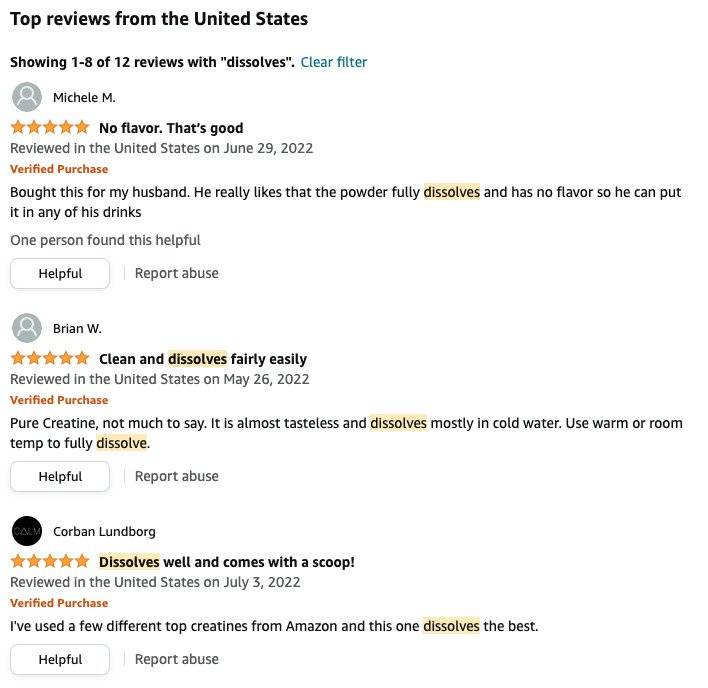
What is Creatine?
Creatine is an endogenous amino acid produced by vertebrate animals with the function of storing and supplying of energy that will be used for muscle contractions by donating phosphate in the conversion of ADP into ATP. This amino acid can be produced by the pancreas, liver and kidneys from the amino acids glycine, arginine and methionine. Dietary supplementation with Creatine may improve muscle loss associated with cancer and other chronic diseases. ADP: Adenosine DiPhosphate | ATP: Adenosine TriPhosphate
In addition to Creatine synthesized by the body, it also can be found in foods such as milk, red meat and seafood. In a normal omnivorous / carnivorous diet, the consume of Creatine is one to two grams/day. Vegetarians may have lower amounts of creatine in their bodies.
What is Creatine Monohydrate?
Creatine Monohydrate is the monohydrate form of creatine similar or identical to endogenous creatine produced in the liver, kidneys and pancreas. The main differences between them are the type of filtration and the speed of absorption. Creatine monohydrate is slowly absorbed as it undergoes a simple filtering process.
Creatine Monohydrate powder has been the most extensively studied and commonly used form of creatine in dietary supplements since the early 1990s
In summary, while some forms of creatine may be more soluble than creatine monohydrate when mixed in fluid, evidence-based research clearly shows creatine monohydrate to be the optimal choice.
Journal of the International Society of Sports Nutrition:
https://jissn.biomedcentral.com/articles/10.1186/s12970-021-00412-w
What is Creatine HCL?
Creatine HCL, or Creatine Hydrochloride, consists of Creatine Monohydrate with the addition of a hydrochloric acid group to increase solubility and overall absorption rates. Binding with hydrochloric acid results in its rapid breakdown by the body and absorbed by muscle cells more quickly. With the fastest rate of absorption into the bloodstream, it reduces water retention as well as side effects.
Which type of creatine is best?
The best form of creatine you can take is called Creatine Monohydrate. It’s a very cheap creatine and it’s backed up by hundreds of studies done over decades.
Creatine has been studied extensively as a dietary supplement for decades. Over these decades, more than a thousand studies were produced that concluded that creatine as a supplement generates better performance in physical exercises. The vast majority of studies have been performed using creatine monohydrate.
Some of the main reasons why creatine monohydrate is the best choice:
Best and safest
Creatine Monohydrate has the best security record. It is the safest creatine due to the large number of researches made using this creatine variation.
There are several types of creatines that chemically differ in how the molecules are bonded, making them easier or more difficult for the body to metabolize. Creatine Monohydrate is the most suitable for beginners as it has been widely studied and approved by scientists for decades.
- Has the best security record
- Has the greatest scientific support
- Improves exercise performance as well or better than other forms
- It’s the easiest to find
- It’s the cheaper
To tell which creatine is best powdered creatine, we considered scientific publications about the matter, and monohydrate was by far the winner in number of papers published.
Does creatine make you fat?
No, creatine will not make you fat. What creatine does is retain water in muscle cells, and this results in weight gain. To gain fat you have to consume more calories than you expend and this is not the case with creatine.
You may ask which creatine is best for fat loss?. So the best creatine for weight loss and muscle gain based on scientific research is creatine monohydrate, or micronized creatine monohydrate.
Does creatine actually work?
Scientific studies have concluded that daily doses of creatine supplementation are effective in increasing intramuscular creatine stores, muscle growth and muscle performance/recovery.
Source: https://jissn.biomedcentral.com/articles/10.1186/s12970-021-00412-w
Which is the best type of creatine? Monohydrate vs HCL
Monohydrate vs HCL:
Creatine HCL and Creatine Monohydrate have the same effectiveness technically speaking. In summary creatine HCL has faster absorption rates, reduced side effects and lower doses.
Creatine monohydrate has in its favor the fact that it has been on the market longer than other commercial creatines, and is supported by a huge amount of research that confirms its effectiveness, in addition to being more accessible (cheaper) and higher level of purity.
To date, creatine monohydrate is probably the most effective and cheapest option available for building muscle. Most studies conducted on the subject have used this type of creatine.
Is creatine bad for your kidneys?
Creatine’s strong safety profile is commonly overshadowed by media reports claiming that it harms your kidneys – a claim that currently has no scientific research to support these claims.
Creatine have a strong safety profile. Studies involving people of different ages have found that taking creatine in supplement form does not harm the health of the kidneys. The studies used doses ranging from 5 to 40 grams per day for periods of 5 days to 5 years.
The claims that taking creatine supplements damages your kidneys probably exists because creatine is known to raise creatinine levels above the normal range. Creatinine is a poor marker of kidney damage.
Creatine intake has been shown to be safe in people consuming high-protein diets, which have also been erroneously linked to kidney damage.
A study in people with type 2 diabetes (which can damage the kidneys) found that taking 5 grams of creatine daily for 12 weeks did not impair kidney function.
People with impaired kidney function or kidney disease should always consult their doctor before taking creatine or any other supplements.
Source: https://www.healthline.com/nutrition/creatine-pros-and-cons#safety-concerns
What is NSF?
NSF for the development of public health standards and certification programs that help protect the world’s food, water, consumer products and environment.
What is NSF certification for supplements
NSF developed testing standard and product certification program strictly for dietary supplements. The program protects consumers by testing for harmful levels of contaminants and certifying that supplements contain the ingredients listed on the label and nothing else.
There are three main components of the NSF dietary supplements certification program:
- Label claim review to certify that what’s on the label is in the bottle
- Toxicology review to certify product formulation (we don’t test for efficacy)
- Contaminant review to ensure the product contains no undeclared ingredients or unacceptable levels of contaminants
Source: https://www.nsf.org/consumer-resources/articles/supplement-vitamin-certification

